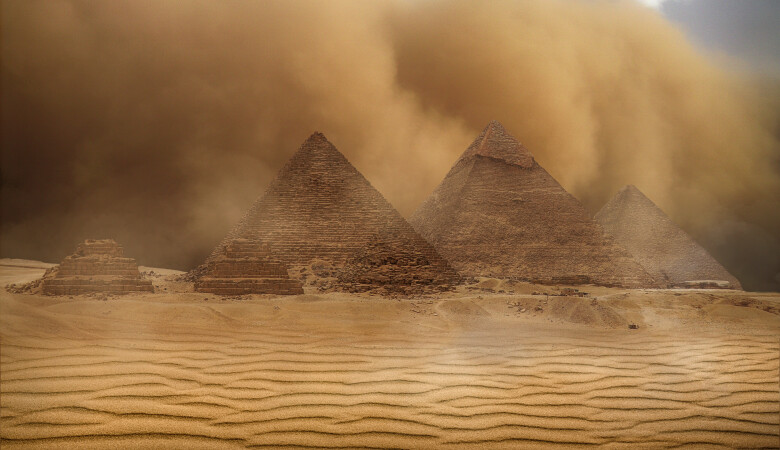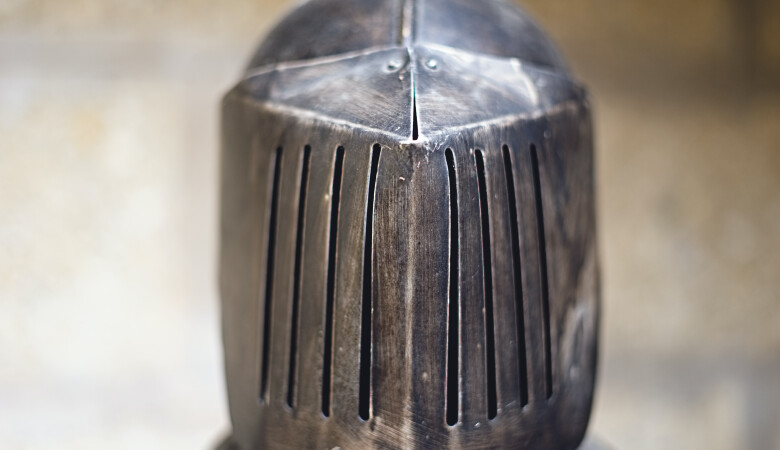God is Everything... So Trust in Him, Not in Your Schemes (Isaiah Sermon 33 of 80)
December 02, 2012 | Andy Davis
Isaiah 31:1-9
Repentance, Politics
Pastor Andy Davis preaches a verse-by-verse expository sermon on Isaiah 31:1-9. The main subject of the sermon is why we should trust God's sovereignty over our man-made plans.
- SERMON TRANSCRIPT -
So turn in your Bibles to Isaiah chapter 31. And as you do, I just, I wanna ask a searching question of you, one of those interesting questions that you just kind of line yourself, your life up against, but here it is. If your house were burning and you had only a short time to get something out of the house, what would you get? Now, of course, immediately you're gonna ask, is everyone safe? Is everyone out of the house? And that's right, that's fine. Start with the people. They're irreplaceable. People are unique, and so we wanna be sure that everyone's safe, but in my little story, everyone's safe. Everyone's out, and you have a chance to get something out of the house. One thing that you can carry. What would you pick? What would it be? Would it be a photo album? Would it be some mementos that are irreplaceable? If they burn, it can never be replaced, can't buy them in a store or something like that... Maybe an heirloom, a family heirloom, maybe a box of silver that came from your grandmother, and you just could never get that back. Something precious like that. Doesn't matter what it is. You're just thinking about it right now, okay? And so that question causes your value system to rise up and be exposed, doesn't it? What it is you value among your possessions. It just does. Friends, that's exactly what happens when we're going through trials, and they're not so much the value system, but this one question. What are you trusting in? It just rises up to meet the trial. It exposes, it brings to the surface your trust structure, your savior, if I could be that bold.
So, for example, let's say you're going through a health crisis, let's say you're awaiting the results of some pretty serious diagnostic tests for perhaps a fatal illness and you haven't heard yet, and your mind is going through the various options. What if it is cancer of that type? What if it's leukemia? What if it is a rare liver disorder that is usually fatal? What then? What are you gonna think? Well, it's amazing what medical science can do these days. It's incredible what the pharmaceutical researchers can come up with. Surely they'll come up with something to save my life, or we live in a great city, the City of Medicine, there's got to be some skilled surgeons, some skilled medical people. You start having these thoughts. Friends, your trust structure is floating to the surface. And my question is not so much do you have these thoughts, but on what are you ultimately resting in that time? That's the question.
Or suppose it's an economic trial, maybe you're facing the loss of your job, or you already have lost your job. Maybe just dim economic times, difficult times. Maybe in your company, 30, 40% of the workforce has already been let go, and you know that this week there are more layoffs coming. And you're anticipating, you're looking ahead to the future and thinking, "Okay, how am I gonna face this trial? Well, it's okay, I have a year's worth of salary saved up." Trust structure starting to float to the surface. ‘I have a great resume, even if I lose this job, I've got some great contacts in the industry, I've got some friends I can call, they owe me some favors anyway, I don't know if they remember that, but I remember. And so I can make some phone calls, I can network, and I'll be employed soon.’ Your trust structure is rising up to meet the trial. And that goes for any trial that we face. Frankly, that is exactly why God brings those trials to begin with. Frequently called in Scripture, fiery trials. Peter calls them, ‘Don't be surprised at the fiery trial you're going through.’ At the end of our scripture here today, in verse nine, it says, “Declares the Lord whose fire is in Zion. Zion's, the city of God, where he dwells with his people. Whose furnaces in Jerusalem. He's bringing a fire on his people, and that fiery trial tests the people.” It shows them what the alloys are in their heart. It causes their trust structure to rise to the top.
And here's the thing: our God is a jealous God, and he is very jealous over your trust structure, your trust mechanism, your heart. He's zealous over how it is, what it is you trust. He wants that. He yearns for that. He's jealous over that. He wants you to trust in him and in him alone, and in nothing else, so he's gonna bring trials in your life because frankly, you, like me, we're all the same, we're trusting in the Lord plus some other things. You know you are. And he wants to purify that, and as I said in my prayer, I alluded to it, it doesn't happen during the easy times. It doesn't happen during the times of prosperity. Those trust structures aren't exposed, and we're not caused to turn away from them during easy times. And as you know, I love the hymn, which has these words in it, "See the incarnate God ascended. Pleads the merit of his blood, venture on him, venture holy, let no other trust intrude." Those words, they're not scripture, but just powerful hymn, and they just weigh on me, each one. Any other trust than Jesus, who shed his blood for me is an intrusion between me and God, has no place there. And yet I know of my heart that other trusts are intruding all the time, and it's hard to keep them at bay. And so the Lord must bring, does bring significant, painful trials into our lives to expose, to strip away any deceptions and illusions and to show us what we are leaning on, what we are relying on, what we were trusting on. 'Cause he wants it for himself.
"Our God is a jealous God, and he is very jealous over your trust structure, your trust mechanism, your heart. He's zealous over how it is, what it is you trust. He wants that. He yearns for that. He's jealous over that. He wants you to trust in him and in him alone, and in nothing else,"
That's what Isaiah 31 is really ultimately about, Isaiah 31 is ultimately about that. It's a series of prophecies given at the end of the 20s of Isaiah on into the 30s, 28-35, a series of oracles, a series of prophecies made by the prophet Isaiah, the Old Testament scholars time them somewhere between 705 BC and 701 BC. By that time, the Northern Kingdom of Israel had already been exiled by the Assyrians for their wickedness and their sin, their idolatry. They're already gone. Southern Kingdom of Judah is still threatened, significantly threatened by Assyria. They're facing, as far as they're concerned, imminent invasion. We've said before the Assyrians were the Nazis of the ancient world. They were a vicious tyrannical empire-building people. They used psychological warfare, they used cruelty, and they were adding kingdom to kingdom, and they were seeking to advance their own empire. That's who they were. They were intimidating, they were terrifying, and they were coming. That's a fiery trial, and it was exposing the Jews of Judah, that Southern Kingdom, exposing their trust structure. Now during that time, godly King Hezekiah was doing some works of reform in the Southern Kingdom of Judah, finally getting rid of those offensive high places and causing the Jews to worship in Jerusalem as they had been commanded to do by the law of Moses. Those high places were stubborn errors in the lives of the people that Hezekiah finally saw through to the removal of them. But he was also surrounded by some, it seems, faithless counselors who were giving him advice and pushing him to do something more than just spiritual answers. They were reaching out to Egypt in particular, sending emissaries, ambassadors down to Egypt with gold and silver on camel backs and donkey backs, making their way across that Negev, that desert to Egypt to get some advice and counsel from the wise men of Egypt, and to seek military protection from the Egyptians. And that deeply offended God. He was deeply offended by that.
I. Woe to Those Who Trust in Egypt Rather Than God (vs. 1-3)
It really bothered him, and so there's a series of oracles, one after the other about this very thing, so look at verse one, "Woe to those who go down to Egypt for help, who rely on horses, who trust in the multitude of their chariots, and in the great strength of their horsemen, but do not look to the Holy One of Israel or seek help from the Lord."
So we begin again with that prophetic word, "Woe" it's very common. It was used more by Isaiah the prophet than any other prophet. He said it about himself. You remember in Isaiah 6, "Woe is me. I'm ruined." It's a word of prophetic judgment really of spiritual danger from the Holy God. Now, an impending judgment was coming. God in his grace would send a prophet like Isaiah to speak a warning, and he might introduce that warning with the word "Woe.” God was offended. He was offended by their overtures to Egypt. It's angering him that they are reaching out to Egypt and they're not relying on him, that they're putting their faith in Egypt's cavalry. And they're forgetting God And so he speaks this word of warning, this word "Woe." Woe to you for doing this. Woe to you. So they were terrified of Assyria, and they're making provisions and plans. They had stratagems for what to do with the impending Assyrian invasion. That was their strategy, but they were forgetting the real danger. The real danger was not Assyria. The real danger was God. The real danger was God. He had said this earlier in Isaiah 8:12-13. There he commanded the prophet himself. Isaiah said, "Do not fear what they fear, and do not dread it. The Lord Almighty is the one you are to fear. He is the one you are to regard as holy, he is the one you are to fear, he is the one you are to dread." So in effect, Judah, you're afraid of the Assyrians, and you are missing the whole point. They wouldn't even be coming if your relationship with me were right. They wouldn't even be coming.
God is the issue. God is always the issue, not the trials or whatever you're going through. It's always about your relationship with God. God and God alone. Simply put, from Romans 8:31, "If God is for us, who could be against us?" Right? Well, let's turn it around. I think the corollary is true. If God is against you, then who cares who's for you. How terrifying is it if God has you in his crosshairs for judgment?
So, the key question coming to us as we look in the mirror of the Word, as we look down in the mirror of Isaiah 31, the key question just rising up off these nine verses is, in what are you trusting? What are you trusting in today? What are you relying on? Are you relying on your own version of Egypt's cavalry and chariots and all that? The word rely means to stay or support. Something you can lean your weight on. What are you leaning your weight on spiritually? Now, the leaders in Judah, they had it all figured out. They said, ‘Now listen, we've got a great infantry. We're really good on the ground, but we don't have any horses. We don't have any cavalry. So it'd be really, really good if we could get some horses. Egypt's got plenty of horses.’ And so they thought about that, thought about Egypt. And ESV has a little bit different translation of verse one, "Woe to those who go down to Egypt for help and rely on horses," listen, "Who trust in chariots because they are many, and rely on horsemen because they are strong." You see the quantity of Egypt's horsemen and the quality, the strength, and power of their chariots, that stimulated faith in the hearts of the Jews, that stimulated trust, their trust was rising up to their thoughts of, ‘Hey, they've got a lot of horses. They get a lot of... Hey, I think that might be something we can do.’ So that's the ground. It's the reason for their trust.
But they were giving no thought to the Lord's might or to his wisdom. And as I said, even deeper, to God's role in bringing the Assyrians, they, at the end of that verse, it says, "But do not look to the Holy One of Israel or seek help from the Lord." In all their plans and schemes, they gave no thought to the Lord, they did not consider the fact that God has infinitely more power than the Egyptians or Assyrians, or all the nations of earth combined, and even worse... And we'll get to it later, they neglected the fact of their own idolatries, their own sins that were causing God to act in this way anyway, bringing the Assyrians. They weren't thinking about that.
Now, this whole thing, as I've mentioned before, was directly forbidden, was foreseen, and directly forbidden by God in the book of Deuteronomy. Before they even entered the Promised Land. God spoke to Israel through Moses. They had already been delivered from Egypt by God's mighty hand and outstretched arm. They had sadly had to wander in the desert for 40 years because of their own sinful unbelief, but now the time had come to enter the Promised Land. They're there, and the plains of Moab across the Jordan River, and God gave them the law a second time, Deuteronomy. And he added to it, he foresaw the day when Israel would have a king. They didn't have one at that point, they had Moses as a prophet and leader, but they had no human king. But he foresaw the day when they would have a king. Deuteronomy 17 gives restrictions and commands about the king, and he says in Deuteronomy 17:16, "The king, moreover, must not acquire great numbers of horses for himself or make the people return to Egypt to get more of them, for the Lord has told you, you are never to go back that way again." It's already told them. This is the very thing you must not do. Friends, as Jesus put it very plainly: no one can serve two masters, and you can't trust in two saviors. It's gonna be one or the other. And they had already made their decision. They were trusting Egypt and not looking to the Lord and relying on God. They made their decision. And in the scripture, you see again and again in the Old Testament, the arithmetic of God doesn't add up to man, you know what I'm saying? God just does things mathematically differently than we would do.
I mean take the case of Gideon, for example. Gideon, you have too many men to fight this battle. That's weird. Too many men? God, I was praying that you had actually helped me with the mustering here. We're not getting a great turnout here. They're afraid of the Midianites. As well, they should be. No, no, still you have too many men. You remember, little by little, he whittles the troop's down to just a small number of men, 300. And they go into battle with no weapons in their hands at all, I mean, that's just... God's ways are not our ways. But he's very plain about why it must be this way, so that you will not boast against me, that it was by your own strength you defeated the Midianites. He does this again and again. God's arithmetic just doesn't add up. Take the case of Asa in 2 Chronicles 14, when the Kushites come with a million men, a million men, myriad of myriads. NIV just gives us a vast army, but I like a million men. What do you think? Especially since Asa's troops number 300,000. Outnumbered three to one. Who's gonna win? Whoever God wants to win. It's really that simple. Whoever God wants to win. In that case, he wanted Asa and his 300,000 men to win. Or take the case of Jehoshaphat in 2 Chronicles 20, when the Moabites and Ammonites came out again with a vast army, and Jehoshaphat didn't even go out and fight. They just went out and worshipped and waited, and the Moabites and Ammonites killed each other to a man. And then Jehoshaphat collected the booty. What a powerful, mighty army we have. It's like, yeah, you're good at collecting booty for a battle you didn't even fight. God does this again and again.
Now, this passage is not, I think, reject military preparations out of hand as though somehow they're wrong. It's not saying that. There are ample evidences of godly people in the Bible making military preparations. Jesus even talked about that, about you see an invading army and too many men, and you sit down and calculate, and you send out emissaries to win peace. Jesus even talked about that. But the issue is trusting in that. Thinking that because you have a mighty army, a big army, you're definitely gonna win all the battles, and forgetting God in all of that. So a military preparation, fine, as long as it's a subset of openly trusting in God to deliver.
This is, I think, a good warning to our nation, in particular. To the United States of America. America has an astonishing military budget. Maybe you haven't looked it up. It's absolutely astonishing how much money we spend in military. How much is it, pastor? Okay, well, all the nations on earth together spend, it's estimated last year, spent 1.7 trillion dollars on military, all the nations together. America spent 711 billion of that. Billion is just one thing over from trillion. That's 700 billion that heading toward a trillion. Simply 42% of the world's military expenditures are spent by the United States of America, 42%. And as a matter of fact, if you look at the next 14 nations combined, I don't have it memorized so I'll read it, “China, Russia, United Kingdom, France, Japan, Saudi Arabia, India, Germany, Brazil, Italy, South Korea, Australia, Canada, and Turkey.” Add all of them up. That equals the US, roughly. The next 14 nations combined. What's my point? Well, the point is, it's easy to think that because of all that money, we are safe from attack. You see what I'm saying? We're going to win every battle. The really scary part about that expenditure is, it's coming at a time when we are becoming increasingly secular and increasingly allergic to public displays of faith and God language in the public square, that is a dangerous combination, so be warned, O people who trust in military strength, but do not look to the Lord, it comes right up off of verse one, look at it. Ecclesiastes 9:11, "The race is not to the swift nor the battle to the strong." That's strange. It's in Bible, or this one, Psalm 33:16-17, "No king is saved by the size of his army. No warrior escapes by his great strength. A horse is a vain hope for deliverance; despite all of its great strength, it cannot save." That's a partner verse to the thing being dealt with here in Isaiah 31. Don't trust in the horse. It can't save you.
So that's where secularism and our pride and wealth come to threaten our very existence. Secularism, keeping God out of the public square, making God irrelevant to everything, keeping God language out. That's secularism. Pride. America's determination to have the best stuff. Always the best that money can buy. Wealth, having the economic means to buy a lot of that best stuff, for example, the ability to afford a nuclear-powered aircraft carrier at 4.5 billion dollars each, and that's without the airplanes. The total cost of the 10 Nimitz-class carriers we have, close to 100 billion dollars just for the carriers and the airplanes. So, now we Christians based, instructed, by text like Isaiah 31, we should know better. And what we have to do is be light in a dark place and we need to be salt in a corrupt world and say, ‘None of that will deliver us if we are alienated from God.’ And so therefore, let's not be alienated from God. I'm not saying anything about therefore, let's spend less money. I'm not even saying that, I'm saying what is the trust structure? That's what I'm asking.
Ultimately, the issue here is God, and in verses two through five, we see the greatness of God's power, both to destroy and to deliver. God here lays out some of his credentials as Savior. He does it in a marvelous way, it's amazing how they forgot what God had done in the past. Now, Egypt was known for a number of things, known for its wisdom, its wise counselors, known for its economic bounty because of the constantly flowing Nile and the abundant harvest, known for its military strength. Let's take wisdom, for example. The pyramids, as a whole, but especially the great pyramid of Giza, is it just a display of human ingenuity and engineering and just intellectual prowess, it's just staggering. Do you realize that the great pyramid of Giza was the tallest human structure for 38 centuries. For 3,800 years, the Great Pyramid was the tallest man-made thing on earth. Finally, a cathedral in London passed it by in 1525. And then after that, it was an average of 50 to 75 years to till whatever was number one, and then it would be bypassed by the next building, now it's down to like months, I think. You get that honor for about 18 months and the next high rise takes it from you. No one's ever gonna break the Great Pyramids record of 38 centuries as number one. So basically, that's a testimony to incredible wisdom and skill, intellectual prowess. So, the Egyptians are wise. Look at verse two, speaking of God, “Yet he, too, is wise and can bring disaster, he does not take back his words.” I meditated for a long time on the word too, it's just one of the most beautiful under statements here in the Bible, this is Almighty God saying, ‘Alright, I grant that the Egyptians are wise, but I'm wise too. I can do wisdom, I'm good at wisdom. Look to me, look to me. I've got some wisdom for you, how much wisdom do you have? Well, tell you what, let's just do some comparison, they built the pyramid, I built the earth it sits on. And I built their brains too, as they thought about how to do the architecture.’
II. The Greatness of God’s Power Both to Destroy and Deliver
Oh how great, how infinitely vast is the wisdom of God, meditate with me on the wisdom of God now. Psalm 104:24, "How many are your works, O Lord? In wisdom you have made them all." Do you sense in Scripture God's proud of the things he's made? I do. Proud of the ostrich, how fast it can run, proud of the eagle, how high it can soar, proud of the stars, the fact that each one of them is there named by him, and none of them is missing because of his mighty power. he's proud of the things he's made and rightly so. He created heaven and earth. He made the seasons, everything that passes through them, he made the skies and all that soars through them, he made the dry ground and all of the things that grow and flourish, he made the seeds, the genetic code for those plants. Mighty cypress trees and oak trees, little grass down low on the ground, spreading vines. God created all of these things. He, too, is wise, he can do wisdom. He's vast in understanding, and as a matter of fact, no human being can ever be God's counselor. You can't teach him anything. He can teach you a lot of things, but you can't teach him anything, there's never been a new thought in God's mind, he's omniscient. So why in the world would you go down to the counselors of Egypt and neglect to ask me for wisdom? And actually, when it comes to trials, I think it's good to keep a cluster, a triad of attributes of God together, three of them together, keep them in mind: God's wisdom, God's power and God's love. Those three things together are everything you'll need to understand dark providences that come in your life. God is wise in bringing the trials that you need into your life, he's very wise in that, he does not bring you more than you can handle, but he will not bring you less than you need. He will bring less than you want, I can testify to that.
He'll bring less. He'll bring more pain than you want, we want less. We were are like, ‘God, this pain is too much, I would dial it down a bit.’ Don't forget the wisdom of God, God knows exactly what you need. So God is wise in making a plan, what do we mean by the wisdom of God? J.I. Packer in Knowing God puts it this way, “the wisdom of God... Wisdom in general, means to identify the highest and best and most glorious end plus the best route or means to get to that end. So that both the ends and the means are justified completely by the wisdom of God.” He knows what he's getting at, and he knows how to get there. It's the wisdom of God. So he has an incredible plan, and he has the power to bring his plan out. If God were wise but not powerful, then he'd be like some kind of wizened old wise man on some mountain somewhere having great ideas, but having no power to influence the world at all. If he were powerful and not wise, he would be like any one of a number of human tyrants that we've seen in the last number of centuries that had great power, but were wicked and corrupt. And add to that the love of God, the fact that God loves you like an adopted son or daughter, he's not going to use his power and wisdom and trample you, but everything is done out of love for you, for your brothers and sisters. That's how you understand these trials.
So, God is wise and he has the power to bring disaster. God says, ‘I can do wisdom and I can do disaster too.’ And he does not take back his words. So unlike human counselors who may say something and later say, ‘Well, I have a better idea now, or a better insight,’ etcetera. God doesn't ever have to do that. Numbers 23:19, "God is not a man that he should lie, nor a son of man that he should change his mind. Does he speak and then not act? Does he promise and not fulfill?" God never has to take back his words, ever. And God has decreed destruction for his enemies, look at verse two, "He will rise up against the house of the wicked, he will rise up against those who help evildoers." God's not merely a theory, he's not the God of the deists or the stoics that just stays out of human affairs. God interferes and meddles, by the perspective of those who don't want him to do that, God runs the universe by the perspective of those who love what he's doing, he is actively involved in human history, directly involved. And so God has made a plan, that plan was fashioned, it was created before the foundation of the world, nothing has been added to it since, nothing has been taken away from it, since he does not take back his words. Everything right on schedule.
Isaiah 14:24, "The Lord Almighty has sworn surely as I have planned, so it will be, and as I have purposed, so it will stand." Isaiah 14:26-27, "This is the plan determined for the whole world; this is the hand stretched out over all nations, for the Lord Almighty has purposed and who can thwart him, his hand is stretched out and who is able to turn it back?" So as I was teaching the men's Bible study a few weeks ago, just those two words, God's plan, God's hand, God's plan, God's hand. Wise plan, omnipotent hand. Couple that with God's tremendous love, God is love, and you see the beauty of everything God is doing in this world. By contrast, however, the Egyptians are men and not God. Look at verse three, "That the Egyptians are men and not God; their horses are flesh and not spirit. When the Lord stretches out his hand, he who helps will stumble and he who has helped with fall; both will perish together." Now, the contrast here is not flesh versus spirit in a dualistic sort of sense, it's just human, mortal and all that, versus God. "God is spirit," Jesus says, "those who worship him must worship in spirit and truth." God's help is infinitely more powerful than man's help, because they're just offering horse flesh, basically, they're just offering horse flesh, and wouldn't you much rather have the infinite power of the Spirit of God on your side? Now, that's part of the problem, isn't it? God is spirit, he's therefore invisible. He's like a wind. We can't see him, we don't know that he's even there. Therefore, most people don't even believe that he exists, “They say in their hearts, there is no God.” God's existence, his activity must be taken by faith, must be discerned by faith, and he declares that it is his will that both those who help wrongly and those who receive the wrong help, both of them will perish together. Remember, he spoke of a wall at the beginning of this chapter on that. So you go out, you get your Egyptian cavalry, you go get your Egyptian counselors, both the Egyptian calvary and counselors and those who hire them will fall together. He's decreed this.
God is mighty and powerful, and he is undaunted by human power and prowess. He's not intimidated by it at all, he gives us two beautiful images in verses four and five. The first image is God as a mighty lion. Don't you love this? I don't know if this is where C.S. Lewis got it, got his image of Aslan as Jesus, a lion, maybe a lion of the tribe of Judah, I don't know. But I love this verse, look what he says in verse four, "This is what the Lord says to me as a lion growls, a great lion over his prey, and though a whole band of shepherds is called together against him, he's not frightened by their shouts, or disturbed by their clamor—so the Lord Almighty will come down to do battle on Mount Zion and on its heights." It's a great image. So you have this, I get a picture of a lion coming in and grabbing some sheep, let's say, and dragging it off from the flock and kind of settling down to consume it under a tree. A shepherd sees it happen and thinks I better go get some reinforcements. So he gets all of his shepherd friends, like 18 of 'em, let's say, and they kind of keep a distance from this lion who is feeding on this carcass, now this mangled thing, and they're trying to shout and yell and make banging noises and all that, and you get that feeling, the lion is just eating and looks up, and he's just not in any way moved or intimidated, he's not going to move at all, there's nothing they can do to scare him. God is like that, that's what the text says. There is nothing that we can do as a human race, all seven billion of us, there's nothing we can do to scare God. There's nothing we can do to intimidate him or move him off his purpose. Psalm two is the best photo of this in the Bible, the best image of this, "Why do the nations rage and the peoples plot in vain, the kings of the earth take their stand, and the rulers gather together against the Lord and against his Christ, his anointed one. The one enthroned in heaven laughs, the Lord scoffs at them, then he rebukes them in his anger and terrifies them in his wrath." What do you think would happen to those 18 shepherds if the lion leaves the carcass and starts running right at 'em? They're gonna scatter like the chaff before the whirlwind. It is very, very important for us to meditate on the greatness of God compared to human beings. We fear man too much, God's not afraid of us at all.
So that's the first image. The second image is of a bird kind of hovering protectively over a nest, think an eagle here over a bunch of little eaglets. Verse five, "Like birds hovering overhead, the Lord Almighty will shield Jerusalem; he will shield it and deliver it, he will ‘pass over’ it and rescue it." So it's kind of two different images; the first is an image of God devouring a carcass and nothing can move him from finishing his devouring, and the second image is of, maybe a mother eagle sheltering and protecting her young and nothing can get in there to hurt them. And God does both to Jerusalem, interestingly. Now here we have, I think, a clear reference to the Passover. It's in quotations in NIV, maybe also in the ESV, “He will shield it, he will ‘pass over’ it.” Do you see? 'Cause it's the same Hebrew word for the Passover. It's pretty much the same thing that God did in Egypt to begin with, where he told them to take the blood of a lamb and painted over the door posts and the sides and the angel of death would see that blood and pass over and not bring death on the firstborn of anyone in that house, but he brought the misery of judgment on all of the first born of Egypt, from the firstborn of Pharaoh who sat on the throne down to the firstborn of the slave woman at the well, all of them lost if they were not protected by the blood.
And so God is gonna do that again, he's going to send out an angel and that angel is gonna pass over the city of Jerusalem, and he's gonna come down after his enemies, but this time it's not gonna be just household, household, household, one, one, one, it's gonna be the entire Assyrian army that's going to perish that night. 185,000 dying in one night. This is very much like what God says as not just the mother eagle, but Jesus gives us the same idea, but different imagery when he says in John chapter 10, “I am the good shepherd. I know my sheep and my sheep know me. I give them eternal life, and they shall never perish; no one can snatch them out of my hand. My Father, who has given them to me is greater than all; and no one can snatch them out of my Father's hand. I and the Father are one.” We are completely safe in the protection of our Savior, and he will hover over us and shield us and protect us from any enemy so that we may not be harmed.
III. A Call to Repentance: Turn from Idols to the Living God (vs. 6-7)
Well, God having given this warning, ‘Woe to you who go down to Egypt,’ and giving a promise that he is going to shield Jerusalem and defend it and deliver it, now gives them a calling to repentance. He calls on them to repent in verse six and seven, "Return to him you have so greatly revolted against, O Israelites. For in that day every one of you will reject the idols of silver and idols of gold your hands have made." So here is this call to repentance and to return, to return to him, turn back to him, and look what it says in verse six, "To him you have so greatly revolted against." These people have wandered away and they are to return to the one they have greatly revolted against. This is a profound statement.
True repentance means seeing the greatness of your sin, dealing with it honestly. The revolt, the rebellion of our hearts is deeper than we think it is, it's a deeper issue than we think it is. Proverbs 20:5, "The purposes of a man's heart are deep waters, but a man of understanding will draw them out." Okay? So our rebellion against God is deeper than we thought it was, but the love of God in Christ is deeper. Praise God for that song, "Oh, the deep, deep love of Jesus." And your estimation of how deep God's love for you in Christ, it is directly proportional to the conviction you have over your own deep rebellion against him. If your sins were light small things and you have a light, small savior and a light, small salvation. And you're no true prophet or no true pastor if you tell the people that their sins are light, small things. Jeremiah 6:14, "The false prophets have healed the wound of my people lightly, saying, peace, peace when there is no peace." That's not real healing, friends. You don't put Band-Aids over things that need surgery. And so for us, we have to deal honestly, we have to say verse six is about me, return to him you have so greatly revolted against, don't make light of your rebellions and don't make light of your idolatries. Verse seven, "For in that day, every one of you will reject the idols of silver and gold your sinful hands have made." You know what this is? Look at it just grammatically, this is a prophecy. Isn't that marvelous? Not you ought to, or you should, or you better. No, no, no, you will. You will most certainly reject all your idols, you'll hate them all, you'll throw them away to the rodents and bats, he says in Isaiah 2:20. You'll throw them away like a menstrual cloth, he says in Isaiah 30. You're gonna throw 'em away. You'll hate them and you'll throw them away. So I just say, ‘Lord, do that. Let me hate it now. The sooner I can throw them away, the better.’ Amen, hallelujah. And this is a prediction of revival, not some of you will throw away some of your idols, all of you will throw away all of them. Every one of you will throw away all of your idols that your sinful hands have made. This is genuine repentance, you'll hate them, those idols, and turn away from them, and turn to the God you have revolted against, and you'll love him, and you will follow him.
IV. Thus Says the Lord: Assyria Will Fall (vs. 8-9)
And, says the Lord, ‘I'm going to kill Assyria. You don't need to send to Egypt. I'm telling you what I'm going to do. I've told you again and again, I'll tell you again, I'm going to kill them.’ Look at verse eight and nine, Assyria will fall. I'm gonna kill them, ““Assyria will fall by a sword that is not of man, a sword not of mortals will devour them, they will flee before the sword, the young men will be put to forced labor. Their stronghold will fall because of terror; at the site of the battle standard their commanders will panic,” declares the Lord, whose fire is in Zion, whose furnace is in Jerusalem.” The mission to Egypt is worthless, you don't need it, don't send your gold and silver down there, they're not going to help you, their help is worthless, I'm going to act directly and a supernatural sword is gonna come on the Assyrian army, a sword not of many,he says it twice, "A sword not of mortals." Very plain, what he's going to do. And not only that, he goes beyond it. He says, ‘Their fortress, Nineveh, all their mighty fortress cities, they're gonna fall too.’ Actually, this is going to be effectively the end of the Assyrian empire; they're going to start running when they see the battle standard, they will lose their courage, they will lose their confidence, and they're going to get conquered by the Babylonians, that's coming up. God is a consuming fire, and the Assyrians will be consumed in his furnace.
V. Applications
What applications can we take from this? Well, first, I always ask in Isaiah, how does this point to Christ? Well, let's go back to verse two, "He, too, is wise." How wise is God? Or let's ask this question, what is the greatest display of the wisdom of God there has ever been? Is it creation? No. No, it's not. I mean, it's true in Psalm 104:24, "How wise is God, how manifold his works and wisdom, he made them all," that's great, but there's a greater wisdom on display. What is the greatest display of the wisdom of God there has ever been? The cross of Jesus Christ. 1 Corinthians 1:23-24, "We preach Christ crucified to the Greek's foolishness, to the Jew's stumbling block, but to those whom God has chosen, Christ the power of God and Christ the wisdom of God. For the foolishness of God,” so to speak, “Is wiser than man's wisdom."
So here's the wisdom of God for you. I think you know, the Assyrians aren't coming for you. Do you know that? It's like, ‘Great, Pastor. Now we're ready for the Assyrian invasion.’ Well, it's not going to come, the Assyrians are gone, they've been destroyed, but that doesn't mean you're out of danger. There is the same danger facing you as faced the people back then: the holiness of God, the law of God. Judgment day is coming. It is appointed to each one of us to die once and after that to face the judgment. Are you ready? There's only one defense for the holy inquiry of God on judgment day, and that's the shed blood of Jesus atoning for your sins and the covering of Jesus's righteousness given you as a free gift. Trust in him by faith. That is the wisdom of God for you. Do you Christians still need to hear those words? I do. Christ is for me, the power of God and the wisdom of God. I can't get tired of hearing that. So the gospel, I plead with you. Understand Jesus is the only savior, the only defense for that coming judgment, “Salvation is found in no one else, for there is no other name under heaven given unto men by which we must be saved,” Acts 4:12.
"There is the same danger facing you as faced the people back then: the holiness of God, the law of God. Judgment day is coming. It is appointed to each one of us to die once and after that to face the judgment. Are you ready?"
Secondly, that same trust that justifies your soul, live it out with whatever trial you're going through now or the next one that God has planned for you. Live it out. Trust in him alone. Venture on him, venture holy, let no other trust intrude. Don't put your trust in the advances of medical science. Don't put your trust in a year's worth of salary saved up. Don't put your trust in anything but Jesus. You could say, ‘Now, God may use the doctors, he may use the pharmaceutical companies, he may use money that I have saved up, but it's still gonna be Jesus saving me.’ And I look to that. Follow these simple prescriptions when you're going through this trial or the next one, whatever it is, three simple commands. 1 Thessalonians 5:16-18, "Be joyful always; pray continually; give thanks in all circumstances, for this is God's will for you in Christ Jesus." Those three things: rejoice in Christ your Savior, trusting in him; ask God for what you want in the middle of your trial, and give him thanks in advance for what he's gonna do and presently what he is doing.
Thirdly, pray for our nation that we would not trust in the military as a savior. Pray for that. I mean, it could be that there are some elect people haven't come to faith in Christ yet, who are trusting too much in the military, and there could be a Christian fellow soldier that can share the gospel so that they stop trusting in military and start trusting in Jesus. Pray for that, pray for that to happen. Not just soldiers and generals and all that, but elected officials and all that, that they would not trust in the size of the military. Isaiah 31 teaches to turn away from that and trust in God. It does not say make no military preparations, but it says do not trust in them as though they were a savior.
Fourth, hate idols more and more. This is the third time Isaiah has told us that we're gonna throw them away so let's throw away. What do you say? Say, ‘Lord, show me my idols and help me to throw them away.’ And fifth, understand deep repentance as it's taught in this passage. Feel the weight of verse six, "Return to him you have so greatly revolted against." Don't make light of your sins. Say, ‘I am a great sinner, but you are a great Savior, and your salvation's greater than my sins.’ Grace greater than my sins.
Sixth, celebrate what this passage teaches about God. His power to judge his enemy, celebrate that. His foreknowledge to know the end from the beginning, his grace and warning people ahead of time what is to come, ‘Woe to you if you do this.’ His immutability in that he does not take back his words. His sovereign power in ruling over the nations. His ability to work genuine repentance in our hearts so that we hate idols. His utter fearlessness like a lion or like an eagle, to be unintimidated at all by other human beings. His faithfulness to protect his children from all of their enemies. That's eight different things to praise God for. What a great God we serve. Worship him, serve him. And then finally, meditate on God's fearlessness in reference to humans so that you fear man less, fear him less, don't worry what man thinks, don't worry what man can do to you. Be bold in evangelism, be courageous in your stance, your countercultural stance. Don't fear man. God's not afraid, why should you be? You're a child of the living God.
Close with me in prayer. Father, we thank you for Isaiah 31 and all it teaches us. Thank you for the truths that just flow from these words. But Lord, transform us by your word and make us powerful and strong children of God ready to serve you, in Jesus' name. Amen.































